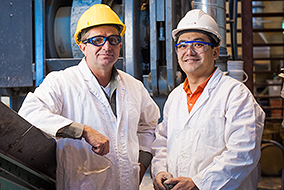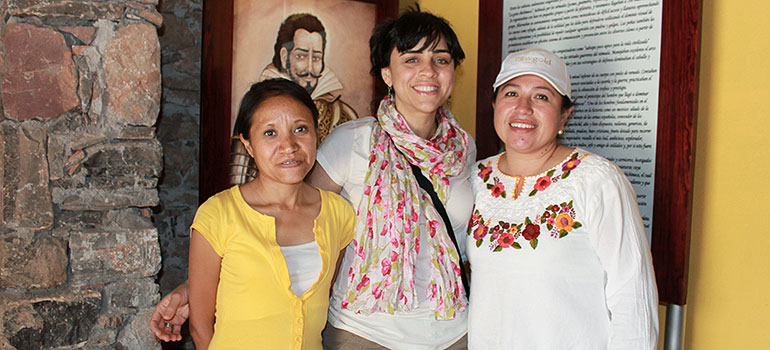If you think all mining engineers talk about is drilling, digging, testing and processing, then you haven’t met the new generation of engineers graduating from UBC.
“All the engineering in the world won’t guarantee success if you can’t get buy-in from the local community and government, and convince shareholders that the mine will operate sustainably and without jeopardizing human rights and the environment.”
Established nearly a century ago, the Department of Mining Engineering at UBC—renamed as the Norman B. Keevil Institute of Mining Engineering in 2006—has been educating mining engineers who now work for many of the 1,200 global mineral exploration companies based in British Columbia. Dozens of alumni have held leadership positions in local and international mining companies, with hundreds more in charge of various aspects of daily operations.
But in recent years, the program—and its graduates—has become increasingly known for its multidisciplinary approach to natural resources extraction, and for highlighting neglected issues such as the use of mercury in artisanal mining.
“There has been a change of focus in our department over the past 15 years,” says Bern Klein, head of the Keevil Institute. “Many of our graduate students have come from non-engineering disciplines, and some have done research that focus on social, health or other non-technical issues, which have also been integrated into our undergraduate curriculum.”
 Jeffrey Selder, who came to pursue a Master’s degree at the Keevil Institute bringing 20 years of mining industry experience, says his involvement in the Global Mercury Project (GMP), spearheaded by Prof. Marcello Veiga, exposed him to the plight of 15 million artisanal miners who use mercury to extract gold, resulting in serious long term health effects. The experience challenged many of his assumptions around mining.
Jeffrey Selder, who came to pursue a Master’s degree at the Keevil Institute bringing 20 years of mining industry experience, says his involvement in the Global Mercury Project (GMP), spearheaded by Prof. Marcello Veiga, exposed him to the plight of 15 million artisanal miners who use mercury to extract gold, resulting in serious long term health effects. The experience challenged many of his assumptions around mining.
“When I met Marcello in 2001, he was a voice in the wilderness when he discussed sustainability-related issues in the mining industry,” Selder recalls. “These issues weren’t seen as belonging to the process of engineering a mine development. Then gradually, more and more engineers within the industry began saying ‘we won’t be able to successfully develop certain mining projects without addressing what Marcello is talking about—namely environmental issues and social, political and human rights issues surrounding projects.”
Now a project manager at Tetra Tech Mining and Minerals, a publicly traded company of 13,000 employees, Selder says the “social license to operate” has become increasingly important in launching new mining sites, referring to the acceptance from local communities of both the mining company and its proposed projects.
UBC partners with Mongolia
When Mongolia’s Oyu Tolgoi mine begins production this spring, the country takes another giant step away from its traditional nomadic herding economy. This will represent the country’s largest-ever financial undertaking—with production of gold and copper projected to account for a third of gross domestic product.
The plan is for Oyu Tolgoi to be socially responsible, environmentally sustainable and beneficial to communities around it—thanks in part to UBC’s Norman B. Keevil Institute of Mining Engineering.
Three years ago, the Keevil Institute reached an agreement with the Mongolian University of Science and Technology (MUST) to help train engineers for Oyu Tolgoi. Forty-seven Mongolian students are on track to graduate from UBC this year with a Certificate in Mining Studies, in time to join the new operation.
Last March, the Keevil Institute and the UBC Institute of Asian Research signed a memorandum of understanding with Mongolia’s Ministry of Education, Culture and Science to advance and promote best practices in mining. The new partnership involves further research exchanges with MUST, and with industry support, scholarships for Mongolian students to obtain Masters of Engineering degrees at UBC.
Last summer, five UBC mining engineering professors travelled to Oyu Tolgoi and delivered courses on mine design and planning, rock mechanics, and asset management.
Bern Klein, head of the Keevil Institute, says UBC’s expertise is in demand because its technical know-how is delivered within the context of environmental impact mitigation, sustainability, good governance, community health and corporate social responsibility—and because of its strong ties with global mining corporations.
“We are making an indelible impact here, not by mimicking what others are doing, but by building on our expertise and experience, and sharing those strengths globally.”
“It takes a lot of IQ from the engineering and science side to develop a mine,” says Selder, who has worked on designing mines for medium and large-scale operations in Peru, Brazil and Chile—areas where mismanagement of social issues by a mining company could increase costs and delay or jeopardize projects. “But it takes an equal amount of emotional intelligence—or EQ—at the corporate level to actually get the mine built and in operation, because you have to navigate some tough cultural challenges. This is a more intangible process.
“For example, a mine may not seem technically challenging on paper, however there may be archaeological sites nearby that require careful attention, or a community of artisanal miners already living and working on a project,” Selder adds. “All the engineering in the world won’t guarantee success if you can’t get buy-in from the local community and government, and convince shareholders that the mine will operate sustainably and without jeopardizing human rights and the environment.”
Silvana Costa was an architect and planner before pursuing her PhD at the Keevil Institute through UBC’s multidisciplinary Bridge Program under the supervision of Veiga and Prof. Malcolm Scoble. Since graduating in 2008, she has assumed the role of manager of social responsibility at New Gold, a mid-sized company with operations in Canada, the U.S., Mexico and Australia. She has worked on the company’s environmental, social responsibility and human rights policies, its sustainability reports, and is developing its social responsibility standards.
Costa credits her ability to influence corporate policy partly to her time at the Keevil Institute: “I have an understanding of both the technical and social issues and risks associated with the business, and can communicate well with engineers and other mining professionals.
“In one of our sites, which is approaching closure, my focus has been largely in working with local staff and others in planning and implementing key steps to ensure that a long-lasting, positive socio-economic legacy is left when it is time for us to permanently close that operation,” she continues.
“The work has been extremely rewarding. It is absolutely wonderful to know that you can make a difference in an organization and on the way it interacts with society.
“This is particularly amazing in mining because what we do impacts so many lives—and our accomplishments often mean improved conditions and opportunities for so many people.”
The unique expertise in social responsibility and industry influence of the Keevil Institute was instrumental in its bid to establish and operate (in partnership with Simon Fraser University’s Beedie School of Business) the Canadian International Institute for Extractive Industries and Development (CIIEID), with a $25-million grant from the Canadian International Development Agency.
“Our approach—perhaps typical of engineers—has always been to not only study the social science and anthropology around mining, but to apply what we learn and create sound policies and change mining practices,” says Veiga. “The CIIEID will allow us to assist with new mining operations in developing countries so they not only reap the economic benefit of their resources but create value to the communities.”
Engineers are in a unique position to establish best practices in a place like Mongolia—one of the most highly anticipated new mining areas, says UBC Asian Studies Prof. Julian Dierkes, an expert in mining regulation in the country (see sidebar).
“We are extremely fortunate that our colleagues in mining are concerned with the social and political impact of mining while also deploying their technical expertise.”
With files from Erinrose Handy


